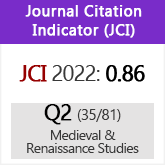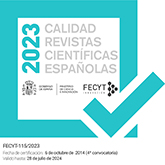The Corpus of Vernacular Glosses (le‘azim) in Ya‘ăqoḇ al-Ŷieni’s Commentaries (Fourteenth Century)
DOI:
https://doi.org/10.3989/aem.2023.53.1.07Keywords:
vernacular glosses, le‘azim, Jewish exegesis, Hebrew Biblical CommentariesAbstract
The Hebrew term la‘az, often found in medieval Hebrew texts, generically designates any language other than Hebrew, and more specifically, European vernacular languages derived from Latin. Within this second, more restricted designation, le‘azim (pl. of la‘az) are short annotations in vernacular that translate and explain Hebrew words and phrases. They may appear between the lines, in the margins or within the body of the text. We find them in a variety of works, but particularly often in biblical codices, grammatical treatises, glossaries and commentaries all of which are works meant to facilitate the learning of the biblical text. Scholars in the history of translation and Romanists alike highlight the value of le‘azim in Old French, Occitan, Catalan, Castilian and other neo-Latin Romance languages for the study of biblical translation and Romance linguistics. le‘azim in Old French, in particularly those included in the biblical and talmudic commentaries of the eleventh-century French exegete Šelomoh ben Yiṣḥaq (Rashi), of great value because of their early date and high number of occurrences, are well known and have been thoroughly studied. In recent times, scholars have also brought to light and analysed other corpora in Occitan and Castilian. This article presents the study of over fifty le‘azim and other observations on the use of the Hebrew language vis-a-vis Romance (and often Arabic). These are interspersed in the biblical commentaries of the fourteenth-century exegete Ya‘ăqoḇ al-Ŷieni, on whose life and whereabouts very little is known beyond the evidence provided by his own works. The analysis of this small corpus allows us to venture into a field -that of le‘azim in the Iberian vernaculars- which has been neglected in the history of biblical translation in the Iberian Peninsula.
Downloads
References
Alfonso, Esperanza (2021), Translating the Hebrew Bible in Medieval Iberia: Oxford, Bodleian Library, MS Hunt. 268, estudio lingüístico y un glosario de Javier del Barco, Leiden, Brill. https://doi.org/10.1163/9789004461222
Aslanov, Cyril (1996), Quelques remarques sur les gloses romanes du Livre des Racines de David Qimhi, "Cahiers d'études romanes" 8, pp. 5-25.
Assis, Yom Tov; Magdalena Nom de Déu, José R.; Lleal, Coloma (1992), Aljamía romance en los documentos hebraiconavarros: siglo XIV, Barcelona, Universitat de Barcelona.
Avinai, Ariel (2016), Peruš r. ya'aqoḇ ben šelomoh al-jiani le-megillat ester, "Qoḇeṣ ḥiṣe gibborim" 9, pp. 222-257.
Baer, Yizhak (1992), A History of the Jews in Christian Spain, trad. de Louis Schoffman, Filadelfia, Jewish Publication Society (2.ª ed.).
Banitt, Menahem (1995-2005), Le Glossaire de Leipzig, Jerusalén, Académie nationale des sciences et de lettres d'Israël (Corpus glossariorum biblicorum Hebraico-Gallicorum Medii Aevi; 2).
Banitt, Menahem (2007), La'az, en Berenbaum, Michael; Skolnik, Fred (eds.), Encyclopaedia Judaica, vol. XII, Detroit, Macmillan Reference USA [en línea], pp. 405-406, link.gale.com/apps/doc/CX2587511729/GVRL?u=jcaa&sid=bookmark-GVRL&xid=40673924 [consulta: 01/03/2023].
Barco, Javier del (2021a), Glossary, en Alfonso, Esperanza, Translating the Hebrew Bible in Medieval Iberia: Oxford, Bodleian Library, MS Hunt. 268, Leiden, Brill, pp. 348-412.
Barco, Javier del (2021b), Linguistic Study of Le'azim, en Alfonso, Esperanza;
Barco del Barco, Javier, Translating the Hebrew Bible in Medieval Iberia: Oxford, Bodleian Library, MS Hunt. 268, Leiden, Brill, pp. 261-347.
Bunis, Marc (2004), Distinctive Characteristics of Jewish Ibero-Romance, circa 1492, "Hispania Judaic Bulletin" 4, pp. 105-137.
Bunis, Marc (2015) Jewish and Arab Medieval Ibero-Romance: Toward a Comparative Study, en Silva Tavim, José A. R.; Lopes de Barros, M.ª Filomena; Liba Mucznik, Lúcia (eds.), In the Iberia Peninsula and Beyond: A History of Jews and Muslims, 15th-17th Century, Cambridge, Cambridge Scholars Publishing, pp. 64-148.
Chapira, Bernard (1945), Contribution à l'étude du Divan de Todros Ben Iehouda Halévi Aboulafia, "Revue des études juives" 6, pp. 1-33. https://doi.org/10.3406/rjuiv.1941.1245
DCECH = Corominas, Joan (1980-1991), Diccionario crítico etimológico castellano e hispánico, Madrid, Gredos (CD-ROM).
DECLC = Corominas, Joan (1980-2001), Diccionari etimològic i complementari de la llengua catalana, Barcelona, Curial Edicions Catalanes - La Caixa.
DCVB = Alcover i Sureda, Antoni M.ª; Moll, Francesc de Borja (1930-1962),
Diccionari català-valencià-balear, Palma de Mallorca, Institut d'Estudis Catalans - Institució Francesc de Borja Moll [en línea], https://dcvb.iec.cat/ [consulta: 01/03/2023].
DOM = Bayerische Akademie der Wissenschaften (2014), Dictionnaire de l'occitan médiéval [en línea], http://www.dom-en-ligne.de [consulta: 01/03/2023].
Enrique-Arias, Andrés; Pueyo Mena, Francisco J. (eds.) (2008), Biblia medieval [en línea], http://corpus.byu.edu/bibliamedieval [consulta: 01/03/2023].
Fudeman, Kirsten A. (2013), Glosses of Hebrew: Medieval French, en Khan, Geoffrey; Bolozky, Shmuel; Fassberg, Steven; Rendsburg, Gary A.; Rubin, Aaron D.; Schwarzwald, Ora R.; Zewi, Tamar (eds.), Encyclopedia of Hebrew Language and Linguistics, DOI: 10.1163/2212-4241_ehll_EHLL_COM_00000301. https://doi.org/10.1163/2212-4241_ehll_EHLL_COM_00000301
Garrido Sepúlveda, Claudio (2015), La restructuración de las oraciones condicionales desde el latín al español medieval: hacia un estado de la cuestión, "Onomázen: revista semestral de lingüística, filología y traducción" 31, pp. 187-204. https://doi.org/10.7764/onomazein.31.12
González Ollé, Fernando (1970), Textos lingüísticos navarros, Pamplona, Diputación Foral de Navarra - Institución Príncipe de Viana.
Hirshman, Marc (1998), Peshat and Derash Side-by-Side: A Newly Rediscovered Manuscript of Midrash Qohelet and of R. Jacob Algiani's Commentary on Qohelet, "Tarbiz" 67/3, pp. 397-406 (en hebreo).
Kessler-Mesguich, Sophie (2008), Tout ce qui n'est pas langue sainte est appelé la'az, en Sirat, René-Samuel (ed.), Héritages de Rachi, París, Éditions de l'éclat, pp. 291-302 (2.ª ed.). https://doi.org/10.3917/ecla.sirat.2008.01.0291
Lambert, Mayer; Brandin, Louis (1905), Glossaire Hébreu-Français du XIIIe siècle: recueil de mots hébreux bibliques avec traduction française, París, E. Leroux.
Lapesa, Rafael (2000), Estudios de morfosintaxis histórica del español, Madrid, Gredos (Biblioteca románica hispánica; 2 - Estudios y ensayos; 418).
Magdalena Nom de Déu, José R.; Lleal, Coloma (1995), Aljamías hebraicoaragonesas (siglos XIV-XV), Barcelona, Universitat de Barcelona.
Minervini, Laura (1992), Testi giudeospagnoli medievali: Castiglia e Aragona, Nápoles, Liguori (Romanica neapolitana; 27).
Pato, Enrique (2006), La génesis histórica de la alternancia modal condicional simple (-ría) / imperfecto de subjuntivo (-se / -ra), en Girón Alconchel, José L.
Bustos Tovar, José J. de (coords.), Actas del VI Congreso Internacional de Historia de la Lengua española: Madrid, 29 de septiembre - 3 de octubre 2003, vol. I, Madrid, Arco Libros, pp. 977-986.
Poznansky, Samuel (1896), Mitteilungen aus handschriftlichen Bibelcommentaren, "Zeitschrift für Hebräische Bibliographie" 4, pp. 118-121.
Roth, Norman (2021), The Bible and Jews in Medieval Spain, Abingdon - Nueva York, Routledge. https://doi.org/10.4324/9781003021346
Sáenz-Badillos, Ángel; Targarona Borrás, Judit (1988), Diccionario de autores judíos. Sefarad, siglos X-XV, Córdoba, El Almendro.
Ta-Shma, Israel M. (1993), Le-toledot ha-sifrut ha-rabbanit be-yavan bame'ah ha-14, "Tarbiẓ" 62, pp. 101-114.
VLCM = Faraudo de Saint Germain, Lluis, Vocabulari de la llengua catalana medieval. Institut d'Estudis Catalans [en línea], http://www.iec.cat/faraudo [consulta: 01/03/2023].
Yanguas y Miranda, José (1854), Diccionario de las palabras anticuadas que contienen los documentos existentes en los archivos generales y municipales de Navarra y de su correspondencia con el lenguaje actual, Pamplona, s. n.
Zotenberg, Hermann (1866), Manuscrits orientaux: catalogues des manuscrits hébreux et samaritains de la Bibliothèque Impériale, París, Imprimerie impériale.
Downloads
Published
How to Cite
Issue
Section
License
Copyright (c) 2023 Consejo Superior de Investigaciones Científicas (CSIC)

This work is licensed under a Creative Commons Attribution 4.0 International License.
© CSIC. Manuscripts published in both the printed and online versions of this Journal are the property of Consejo Superior de Investigaciones Científicas, and quoting this source is a requirement for any partial or full reproduction.All contents of this electronic edition, except where otherwise noted, are distributed under a “Creative Commons Attribution 4.0 International” (CC BY 4.0) License. You may read here the basic information and the legal text of the license. The indication of the CC BY 4.0 License must be expressly stated in this way when necessary.
Self-archiving in repositories, personal webpages or similar, of any version other than the published by the Editor, is not allowed.
Funding data
Ministerio de Ciencia e Innovación
Grant numbers PID 2019-104219GB-100
Agencia Estatal de Investigación
Grant numbers PID 2019-104219GB-100















